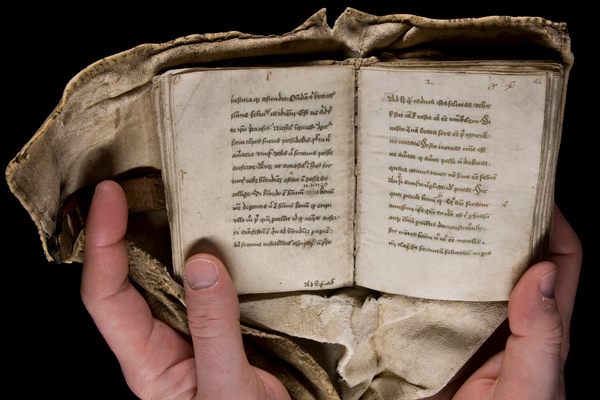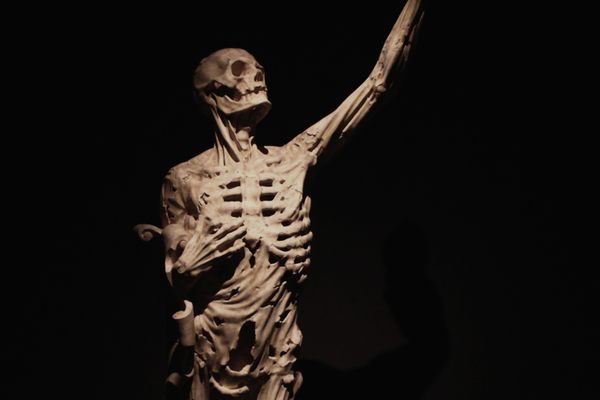Flyting Was Medieval England’s Version of an Insult-Trading Rap Battle

Flyting from Norse folklore and Old England should be incorporated into American politics. (Photo: Public Domain/WikiCommons)
Imagine a world that had swapped its guns for puns and its IEDs for repartees. Such a planet is possible if only those in power would manage their conflicts with flyting, the time-honored sport of verbal jousting.
Flyting is a stylized battle of insults and wits that was practiced most actively between the fifth and 16th centuries in England and Scotland. Participants employed the timeless tools of provocation and perversion as well as satire, rhetoric, and early bathroom humor to publicly trounce opponents. The term “flyting” comes from Old English and Old Norse words for “quarrel” and “provocation.” ‘Tis a form of highly poetic abuse, or highly abusive poetry—a very early precursor to MTV’s Yo Mama and Eminem’s 8 Mile.

“Court flyting” sometimes served as entertainment for royals such as Scottish kings James IV and James V. The most famous surviving exchange is The Flyting of Dunbar and Kennedie, which was performed in the early 16th century by William Dunbar and Walter Kennedy for the court of James IV. A medieval rap battle between two clever men, it featured the first recorded instance of poop being used as an insult. The moment Kennedy called Dunbar a “shit without a wit,” he ushered in a whole new era of scatological humor.

James V, pictured on the left, was known to enjoy some good flyting. (Photo: Public Domain/WikiCommons)
Some choice lines from Dunbar and Kennedie, translated from the Middle Scots, include:
“Gray-visaged gallows-bird, out of your wits gone wild,
Loathsome and lousy, as wet as a cress,
Since you with worship would so fain be styled,
Hail, Monsignor! Your balls droop below your dress.”
Those are just four lines of 128—it’s well worth checking out the rest if you want to up your insult game.
Of course, flyting was not humanity’s first foray into competitive insults. The popular 1938 book Homo Ludens, written by Dutch historian and theorist Johan Huizinga, makes the basic argument that the dawn of civilization was the moment when people started insulting each other rather than (or in addition to) physically attacking each other. There appear to be forms of verbal jousting in pretty much all cultures; for example, one finds similar rituals in Japanese Haikai, naqa’id in Arabic poetry, the Mande practice of Sanankuya and the Nigerian game Ikocha Nkocha.

This is the frill-necked lizard’s version of flyting. (Photo: Matt from Melbourne, Australia/WikiCommons CC BY 2.0)
Forms of ritualized combat exist not only across cultures but also across species and spiritual universes. Gods in Norse literature have been known to flyte, and the concept behind flyting exists in the animal kingdom with agonistic behavior, when creatures establish dominance over each other without actually fighting.
Flyting lacks much written history, but flute-like exchanges of insults exist in early classics such as the epic Old English poem Beowulf and Shakespeare’s King Lear, in which Kent describes Oswald as, among other things:
“A knave; a rascal; an eater of broken meats; a
base, proud, shallow, beggarly, three-suited,
hundred-pound, filthy, worsted-stocking knave; a
lily-livered, action-taking knave, a whoreson,
glass-gazing, super-serviceable finical rogue”
The obvious modern-day equivalent of flyting is the rap battle, but it’s unclear whether the two forms of verbal combat have common ancestry. One academic, the late Ferenc Szasz, was convinced of a clear link between flyting and rap battles, applying his theory that American slaves adopted the tradition from Scottish slave owners.
The overlap of European and African culture in the South, and the question of how much European influence went into the rap battle, is a contentious issue, says Wald, author of The Dozens: A History of Rap’s Mama. “The fact is, there are much stronger survivals of deep African traditions than most people realize,” he says. “But, there also has been an amazing ability of African American culture to adapt and reuse stuff they’ve picked up from European culture.”
One of the major examples, says Wald, is rhyme. “There is no history of rhyme in any African language,” he says. “And that continues to be true in African American culture—right up until the 1880s or 1890s, well after the Civil War, virtually the only rhyme that you find in African American culture is from people trying to do European forms.”
By the 1930s and 1940s, however, rhyme was inseparable from and central to black hip culture. Part of this shift came in the form of “The Dozens,” a battle of insults tracing back to America’s 1920s and 1930s, customarily played out in front of an informal audience that keeps going until one person concedes.
For young African American men, the Dozens was a rite of passage. “The Dozens can be tricky, aggressive, offensive, clever, brutal, funny, inventive, stupid, violent, misogynistic, psychologically intricate, deliberately misleading—or all of that at once, wrapped in a single rhyming couplet,” writes Wald in his book. “Yo Mama” jousts, popularized by MTV, are a successor of the Dozens.
Regardless of whether flyting and the rap battle have an official link, they are ultimately part of the same art. We don’t necessarily need to bring back flyting; we just need to give the rap battle flyting status by making it part of political protocol. The hit musical Hamilton has recently proven that when politicians do rap battles in cabinet, everyone wins. Time to spit a rhyme, powerful people.









Follow us on Twitter to get the latest on the world's hidden wonders.
Like us on Facebook to get the latest on the world's hidden wonders.
Follow us on Twitter Like us on Facebook